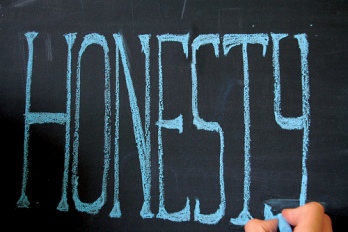To begin with, I searched the internet with the question. The first link that showed up… no joke:
“Honesty Is Still The Best Policy Free Essays 1-20
www.OpPapers.com/…/honesty-is-still-the-best-policy-page1.html 20+ items – Free Essays on Honesty Is Still The Best Policy for students.”
Notice the lack of any pretense: “for students”

While there are plenty of polls (and rationalizations) that examine the question, a study released last month points to one by-product of honesty: health.
“Each week for 10 weeks,” Sharon Jayson writes for USA Today (Study Finds that Avoiding Lies can Improve your Health Aug. 5), “110 individuals, ages 18-71, took a lie detector test and completed health and relationship measures assessing the number of major and minor lies they told that week, says lead author Anita Kelly, a psychology professor at the University of Notre Dame in Indiana. She presented findings at the annual meeting of the American Psychological Association, which ended Sunday.
“ ‘When they went up in their lies, their health went down,’ says Kelly. ‘When their lies went down, their health improved.’
“Researchers instructed half the participants to ‘refrain from telling any lies for any reason to anyone. You may omit truths, refuse to answer questions, and keep secrets, but you cannot say anything that you know to be false.’ The other half received no such instructions.
“Over the study period, the link between less lying and improved health was significantly stronger for participants in the no-lie group, the study found. When participants in the no-lie group told three fewer minor lies than they did in other weeks, for example, they experienced, on average, four fewer mental-health complaints and three fewer physical complaints. Mental health complaints included feeling tense or melancholy; physical complaints included sore throats and headaches.
“Linda Stroh, a professor emeritus of organizational behavior at Loyola University in Chicago, says findings are consistent with her own research on trust. ‘When you find that you don’t lie, you have less stress,’ she says. ‘Being very conflicted adds an inordinate amount of stress to your life.’
“Evidence from past research suggests that Americans average about 11 lies a week. Kelly says the no-lie group participants were down to one lie, on average, per week. For both groups, when participants lied less in a given week, they reported their physical health and mental health to be significantly better that week.”
From my own observations as well as my own behavior, all of us lie. Some are relatively inconsequential: “That tattoo on your arm really compliments your eye shadow”; some carry larger implications: President Nixon: “I am NOT a crook!”
However, while we may judge ourselves by our best intentions, our most noble acts the reality is that we are judged by our last worst act. Although I have admired the many character traits demonstrated by former Penn State football Coach Joe Paterno, the stain of not acting in the best interests of boys he knew were harmed by assistant coach Jerry Sandusky will remain attached to his reputation forever.
Growing up, I spent several years in Catholic schools. Every week we were required to make a “good confession” of our sins which included things like lying, cheating, taking the Lord’s name in vain and the ever popular “impure thoughts.” When it came to confessing lies, I honestly could not remember an exact count, so I just “made up” whatever number came to mind. Some weeks it was low; others were much higher. In essence, I lied about how many lies I told. (When this first occurred to me, I’d add another lie to list rationalizing that I’m trying to keep accounts straight.)
Ethicist Michael Josephson points out that in relationships of trust – our most important relationships – exaggerations, promising what you cannot deliver, deliberate distortions, concealment of important facts and false statements of opinion are all lies. In the long run, ethics is an action concept. It’s not about conduct and behavior, and remains a ground rule for decision making. That decision-making defines our character.
And now we have a study that looks at honesty from a physical perspective.
“ ‘It’s certainly a worthy goal to have people be more honest and more genuine and interact with others in a more honest way,’ says psychologist Robert Feldman of the University of Massachusetts, Amherst. ‘That would be ultimately beneficial. I’m a little skeptical that it makes us all healthier, but it may make us healthier in a psychological way.’ ”
Comments









